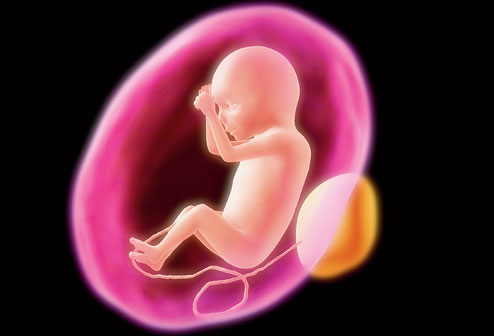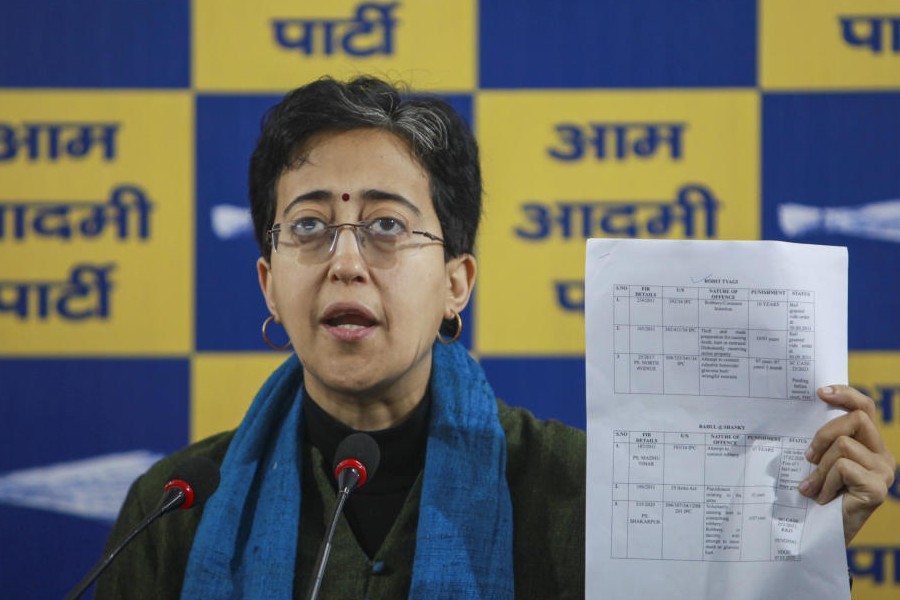Namrata, a television actress, felt it was high time she had a baby. At 33, she could almost hear her biological clock ticking. A few months ago, she and her husband finally took the plunge. But wait. The baby they're looking forward to so eagerly is not growing in Namrata's womb. It's taking shape in the uterus of another woman — a paid surrogate. Not because Namrata had a medical need for a surrogacy, but simply because she did not wish to take a career break in order to have a baby.
A surrogacy is also what Mira Shah, 38, a Delhi-based college lecturer, opted for when she wanted to have a second child. Shah figured that was the only way she could have a baby sans the discomfort of a pregnancy.
It's not quite a fashion statement yet. But it's getting there. A growing number of affluent Indian women, married or single, are looking at surrogacy as their reproductive silver bullet, one that allows them to have a child without having to compromise on their lifestyle. No pain of pregnancy, no stepping back from one's career, no post-partum fat to get rid of — if you have the money (anything between Rs 12-15 lakh), why, it seems like the perfect way to get yourself a baby!
What these women blithely overlook, however, is the fact that surrogacy — where the embryo created from the egg and sperm of the genetic parents is placed in the uterus of another woman — is an extreme option, to be availed of only if it is medically indicated. To them it is just another piece of enabling modern technology. Only, this one pops a readymade baby.
Of course, Bollywood, the arbiter of fashion in our country, has set the trend here too. In December 2011 Aamir Khan and his wife Kiran Rao had a surrogate baby because she had certain medical complications. That same year Sohail Khan, Salman Khan's younger brother, and his wife had their second child using a surrogate mother. And last month it came to light that Shah Rukh Khan and his wife Gauri — both in their late 40s and with two teenage children — have had a third child, this time through surrogacy.
The celebrity endorsement of surrogacy has given it an aspirational aura, if you will. Suddenly, surrogacy is not just acceptable — it's cool. It's what the rich and famous do. So a practice that was once viewed with squeamishness, revulsion even, is now being seen as something to be emulated. As a Bangalore socialite says on the condition of anonymity, 'If it makes life easier, why not surrogacy?'
Infertility doctors say that interest in this particular assisted reproductive technology shot up soon after Aamir Khan had his surrogate baby. 'Surrogacy requests from Indian parents have doubled ever since Aamir Khan went in for it,' says Dr Anjali Malpani of Malpani Infertility Clinic, Mumbai. 'Couples just land up and say 'Aamir Khan ne kiya, hamey bhi karna hai!' And now after Shah Rukh Khan's surrogate child, the interest is bound to go up even more.'
-

Shah Rukh and Gauri Khan
Mumbai-based infertility specialist Dr Indira Hinduja too says that whereas five years ago she did no more than one surrogacy case a month, today she does three or four every month. 'It's become much more acceptable now,' she says.
While that may be a good thing in cases where surrogacy is medically indicated, it's also spawned a class of women who seeks the process simply to bypass the ordeal of pregnancy. While most of them are women in high-powered careers or those in showbiz, there is the odd homemaker too. Dr Anup Gupta, medical director, Delhi IVF and Fertility Research Centre, reveals that out of every 10 queries on surrogacy that he gets these days, at least three are from women like this.
Dr Gupta recently had a case where the 32-year-old wife of a top builder in Delhi had a child through surrogacy because she felt pregnancy would make her look old and leave her with ugly stretch marks on her stomach.
It's a bit like employing a wet nurse to breastfeed your baby — something that upper class women in the West used to do once upon a time — only, this works at a much more organic level.
Needless to say, the trend leaves a lot of people indignant and outraged. 'Just as we appoint maids to do our household work, some women are now appointing surrogate mothers to bear their children for them. It shows the degradation of our value system,' says Ranjana Kumari, director, Centre for Social Research (CSR), Delhi, which came out with a comprehensive study on surrogacy in India last week.
Any respectable fertility doctor will tell you that he or she does not usually entertain surrogacy requests from women who are capable of having a child on their own, or at least through in-vitro fertilisation (IVF) — the more widely used method of assisted reproduction. Indeed, the bulk of surrogacy cases amongst Indians do take place after repeated attempts at IUI (intra-uterine insemination) or IVF have failed to yield results.
However, these days would-be parents often want to jump-cut the IVF process too. If they have failed one or two IVF cycles, they start pressing for a surrogacy even if chances of conception through IVF continue to be good, points out Dr Malpani.
'That's when you need to counsel them,' says Dr Hinduja. More so because surrogacy is hardly a fail-safe option. Its success rate is a modest 40 to 50 per cent.
Still, when the demand is there, some do end up getting their way. Dr Duru Shah, who runs GynaecWorld, a Mumbai-based infertility clinic, recalls a single woman from Calcutta who came to her to have a child through a surrogate. 'She wanted a child with donor sperm, but did not wish to carry it herself as she was single,' says Dr Shah.
In truth, surrogacy is called for in very rare cases. It's needed if a woman has an absent uterus, either from birth (about 1 in 15,000 women) or because it has had to be surgically removed. It may also be needed if the uterus has been irreparably damaged, in case of severe uterine tuberculosis, for example. Naturally, gay couples who wish to have a child also have to use a surrogate mother. But other than that, these are the only two real reasons for choosing surrogacy, says Dr Malpani. 'Yet you see so many surrogacies taking place. So obviously it's being overused,' she says.
The overuse is primarily due to the fact that commercial surrogacy — where a woman is paid to be a surrogate mother — is legal in India. It's a huge, thriving industry, worth about $500 million (Rs 3000 crore), according to the CSR.
Up until now, the industry has ridden mostly on the back of infertile or gay foreign couples who have been coming here to get themselves a surrogate child. That's because commercial surrogacy is illegal in much of the European Union and several other countries like the UK, Australia, parts of the United States and so on. This also gives rise to a host of legal problems when the genetic parents attempt to take the surrogate child back to their home country. Incidentally, this year India introduced stricter rules for foreigners seeking surrogacy here, leading to quite a dramatic fall in their numbers. But that, as they say, is another story.
Indian couples don't face such legal tangles when they go in for a surrogacy. Most top flight clinics charge a consolidated sum of Rs 12 to15 lakh for the entire process. This includes payment to the surrogate mother (Rs 3-4 lakh), her agent or 'caretaker', treatment and delivery costs, fees to the lawyer who draws up the contract between the commissioning parents and the surrogate mother and so on. Essentially, if you have the money, you can go right ahead and hire a womb for your embryo. And claim the fully-fledged, custom-made infant from its gestational mother after nine months.
Interestingly, just as surrogacy has gained currency among the affluent set, it has also become popular among lower middle-class women, who form the supply side of the industry. Many of them choose to be surrogate mothers as they see it as a good way of earning a lump sum. And most say they do it to create a nest egg for their children's education or for buying a home. 'They used to be hesitant to act as surrogates earlier, and were scared of the social stigma,' says Dr Shah. 'But not any longer.'
Rabeya, 27, is a plump, cheerful looking woman with two children of her own. Her husband is an embroidery worker and the family stays in Wadala, Mumbai. Dressed in a pink salwar kurta and a blue dupatta, she smiles and answers questions demurely. This is her second time as a surrogate.
'The first time I did it for my children's education. This time I want to keep the money to buy a house. Hamey ghar lena hai,' she says.
Hasn't she faced censure from her neighbours for renting out her womb?
'Not at all,' smiles Rabeya. 'It's very popular among women in my locality. A lot of them are doing this at different clinics and hospitals — Jaslok, Hinduja, Rotunda, etc. There is no shame in it. Our husbands also support us in this.'
Her 'friend' (read agent) Anwara says she knows at least 200 women in the slums of Ghatkopar, Thane and other areas who have acted as a surrogate or an egg donor at one time or another. 'Seven-eight years ago I had to persuade women to do this job,' she says. 'Now they come to me on their own and request me to take them to a hospital or a clinic. They all feel it's a good way of making some money.' In fact, the practice is so widespread now that most surrogates stay in their own homes during the pregnancy whereas earlier, they preferred to go away to a shelter provided by the clinic lest people found out.
Rabeya will be paid Rs 4,000 per month during her pregnancy and at least Rs 2 lakh when the baby is born. According to the terms of her contract, if she has twins, she will get an extra Rs 50,000. For a Caesarian section or any other complication she will also be paid extra.
Rabeya is one of the happy beneficiaries of India's booming surrogacy industry. But because it is largely unregulated, subject only to a set of guidelines framed by the Indian Council of Medical Research (the Assisted Reproductive Technology Bill has been hanging fire since 2008), malpractices and tales of exploitation are not uncommon.
In fact, last week's CSR report entitled 'Surrogacy Motherhood: Ethical or Commercial', which is based on a survey of 100 surrogate mothers and 50 commissioning parents in Delhi and Mumbai, said surrogates were often duped and not given the amount promised to them. Many of these poorly educated women were also not given a copy of the contract, it found. There are instances where though they were promised Rs 3-4 lakh, what they finally got was only Rs 1-Rs 1.5 lakh. Mostly, it is the middleman or the agency which cheats them, says CSR's Ranjana Kumari.
Abuse is bound to happen, agrees Dr Hinduja. 'Overdoing anything is bad, and will naturally lead to exploitation and malpractices, as has happened in the case of kidney donation,' she says.
But with surrogacy becoming such an attractive reproductive option — to the extent that many well-to-do women are looking to outsource their pregnancy simply because they can afford to — the use of the technology is bound to become even more rampant.
So are we looking at a dystopic future where an underclass of women exists only to bear the children of the privileged classes? One hopes that the government will step in with stringent laws long before that scary scenario comes to pass.
Celebs for Surrogacy
Shah Rukh Khan and wife Gauri had a surrogate baby, AbRam, in May 2013.
Nicole Kidman and her husband, singer Keith Urban, had their second child through surrogacy in 2011.
Aamir Khan and Kiran Rao had a son via a surrogate mother in 2011.
Sohail Khan and wife Seema had their second child through surrogacy in 2011.
Elton John and his partner David Furnish had a son using a surrogate mom in 2010. This year they had another surrogate baby, also a boy.
Sarah Jessica Parker of Sex and the City fame and her husband, actor Matthew Broderick, had twin babies through surrogacy in 2009.
Robert De Niro and his wife Grace Hightower had a baby girl via a surrogate in 2011. De Niro and Hightower were 68 and 56 respectively at that time.
















